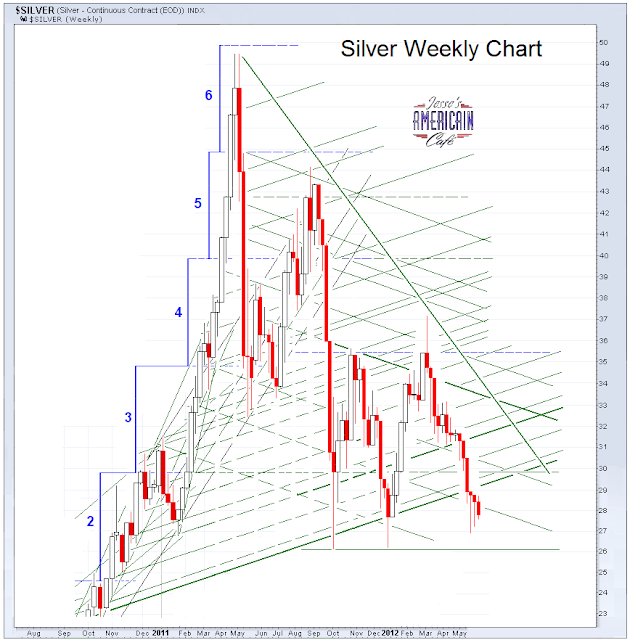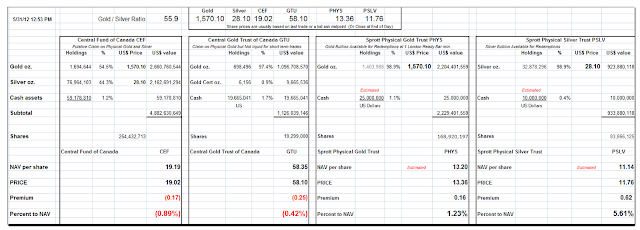I was expecting another 'hit' on the futures contracts around the May-June contract dates I have posted several times.
Perhaps the antics today will be all for now. Let's see what happens.
Someone said something unintentionally funny about the Social Security Trust Fund bonds and the reliability of the US government today that I ordinarily would ignore, but it may serve to illustrate a point.
This fellow seems to think that defaulting on the Social Security Trust would be fine and good, because 'the money is not there, it is spent.'
That can be said about almost ANY bond that is ever issued. The bonds are essentially instruments with certain terms backed by 'the full faith and credit' of the borrower, or some other designee. The money received for them is almost always 'spent' or in the case of a trust invested in some other instruments. That is the purpose of issuing the bond, whether they are for a retirement plan, a school, or a missile defense system!
In the case of Social Security there are two types of bonds that are now held, both 'special issue' meaning that they are not publicly marketed through the primary dealers. This is a bit of a change, in that the Trust formerly held both public and special issue bonds.
The Social Security trust funds are financial accounts in the U.S. Treasury. There are two separate Social Security trust funds, the Old-Age and Survivors Insurance (OASI) Trust Fund pays retirement and survivors benefits, and the Disability Insurance (DI) Trust Fund pays disability benefits.
Social Security taxes and other income are deposited in these accounts, and Social Security benefits are paid from them. The only purposes for which these trust funds can be used are to pay benefits and program administrative costs.
The Social Security trust funds hold money not needed in the current year to pay benefits and administrative costs and, by law, invest it in special Treasury bonds that are guaranteed by the U.S. Government. A market rate of interest is paid to the trust funds on the bonds they hold, and when those bonds reach maturity or are needed to pay benefits, the Treasury redeems them.
You can see a listing the Treasury bonds held by the Social Security Trust
here.
The key point is that the
special issue bonds are not subordinate debt, or a secondary obligation, but
fully guaranteed by the full faith and credit of the Treasury. I have never actually held or read one of the bonds, but this is my understanding of it, and would accept detailed and specific language that shows that they are susceptible to selective default based on the wording of the bonds or a specific statute and not some interpretation of other documents.
Yes, the Congress can make changes to the Social Security System as they have done in the past, although they generally make those changes gradually, and set future dates for the changes. They have even denied a person in the past from collecting Social Security
(Flemming vs. Nestor) because of the transgressions against the state, in this case a non-citizen who was deported for their activities in the Communist party at the height of the Red Scare. It is not a general precedent, and finds no application in general case law with which I am familiar, although I no longer have access to Lexus. It will stand as a specifically narrow ruling so long as it is not challenged or expanded by some other case(s). That is how law of precedents works.
The government can also revoke your right to vote should you be convicted of a specific class of criminal offense. Does this mean that the government has broad powers to deny the right to vote to anyone it wishes for any reason, or that it can easily do so?
But the key point is that it does not really matter since
this does not affect the underlying value and guarantees of the special issue bonds in the Trust fund which is the whole point of this. Not one bit. When it comes to the bonds, they are backed by 'the full faith and credit' of the Treasury, the same as any other bonds it issues.
And as such, they are no different than the bonds issued for public sale by the Treasury which are held by China in exchange for their own inputs for example. And this includes bonds of zero duration, which are Federal Reserve Notes.
What I find a little repugnant about some of the arguments about the Social Security Trust is that they are sometimes put forward by people who would
like to see the obligations defaulted upon, in order to provide extra tax cuts to the wealthy for example. That is a matter of policy and law going forward, and has nothing to do with the status of the special issue Bonds of the Treasury. If some people wish to take from the old and the poor and give to the rich they will have to find some other justification than the value of the Special Issue Treasury Bonds.
By the way, this argument about the existence of the Trust Fund has its roots in the Bush II Administration. Who would have guessed that?
"Some in our country think that Social Security is a trust fund – in other words, there's a pile of money being accumulated. That's just simply not true. The money – payroll taxes going into the Social Security are spent. They're spent on benefits and they're spent on government programs. There is no trust."
George W. Bush, February 9, 2005
It is not clear to me that Bush II understood what he was saying, understood the legal and economic issues and their implications, or really did not care. If some politicians would like to say the money taken from the public and held in Trust is not there, that the bonds are a fraud and subject to default, then they ought to be able to say who stole it and when, because theft and betrayal it surely is, and as bad or worse than the theft of customer money from the accounts at MF Global, which similarly vaporized by unknown hands, or so they claim.
And that hardly lends itself to trust, for who can have confidence in the full faith and credit of a thief and a betrayer of trusts, who goes so far as to rob the elderly and the disabled? Is this the government of Washington, Jackson, Roosevelt, Jefferson and Lincoln?
How are the mighty fallen, and their oaths of duty and honor perished.
But these are all plays on words in the manner of Washington and the financiers. There is a Trust and it contains special issue bonds guaranteed by the Treasury. Some confusion arises because they are not
marketable bonds, which means that their value does not vary, and the Banks cannot get their mitts on them to take a piece of the action. So technically one might think that they are not assets. But they are liabilities and are included in the calculation of the public debt.
These comments were criticized as laying the groundwork for defaulting on almost two trillion dollars worth of US Treasury bonds, or more likely facilitating the transfer of the obligations of the Trust into private investments such as US equities. At the same time in 2005 Wall Street brokerage firms were lobbying heavily for the suspension of Social Security in favor of privately held retirement accounts, managed by them of course. George W. was most likely just reading the talking points for his constituents.
Fortunately it did not matter because the President has no power to default on the sovereign obligations in the Trust even by Executive Order; only the Congress has that power. And no matter what existential
truthiness arguments pundits like George W. Bush would like to make to justify it, the action would be to declare a selective default on over two trillion in US government bond obligations.
But perhaps more important than the arbitrary respect for legality, the principle of the law of the markets is an impediment to be overcome. Creditors become
very uneasy when they see an organization or government that starts to default on its sovereign obligations, particularly foreign holders of the debt who are often as disadvantaged in the local power structure as the weak and the old.
But the punchline of the whole thing was this.
This person went on to suggest, in colloquial language, that indeed the bonds are obligations, but so are Greek bonds. And if you can't pay you can't pay.
In other words,
US bonds backed by the 'full faith and credit' of the US government are no different than Greek bonds. To that I might add, not yet, but give it some time. lol
In one of the instances where I might agree with Modern Monetary Theory (MMT), a sovereign issuer of its own currency never really has to default on its bonds, if the terms of payment are in their own currency, and they have the right and ability to create any amount of that currency which they wish. The US has this ability, and unfortunately for Greece they do not.
Where I disagree somewhat with MMT is that this is a bit of sophistry, a technical nicety. Yes, they may avoid a technical default on the longer duration bonds, but a sovereign issuer most certainly can and has defaulted on the value of their currency, or their bonds of zero duration in a fiat currency regime. In most cases it is a protracted erosion of value, and the US has been doing a good job of this for the past 75 years or so to say the least.
The only 'currencies' that do not bear such counterparty risk from the issuer, that do not rely on the full faith and credit of some issuing authority, are gold and silver. And this is why they have been used throughout history as such, because they are natural currencies from their very characteristics of durability and relative scarcity.
Governments can and have interfered with gold and silver, and made it their own, setting the value. They have even seized it in the past on some pretext. But they have also handed tickets to families and sent them to relocation camps as well. There is a chasm of difference between what can happen and what will likely happen, and what the possible responses to arbirary actions and even the oppression of tyranny might be
And there you have it. The case for the direct ownership of gold and silver, the only currencies that do not rely on the promise of a temporal government or entity, but stand by their own value from their very nature.
*Technical Note: When I refer to Federal Reserve Notes as government bonds of zero duration, one can consider that shorthand for 'government zero coupon bonds of unrestricted duration.' Thanks to Knukles for forcing me to the additional precision. lol.









































































